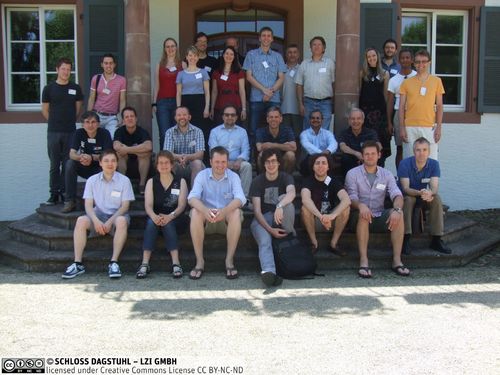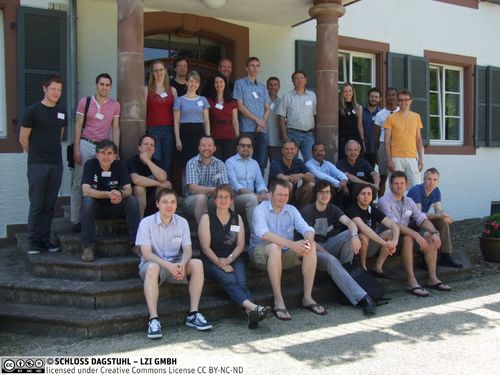Dagstuhl-Seminar 13252
Interoperation in Complex Information Ecosystems
( 16. Jun – 19. Jun, 2013 )
Permalink
Organisatoren
- Craig A. Knoblock (USC - Marina del Rey, US)
- Kai-Uwe Sattler (TU Ilmenau, DE)
- Rudi Studer (KIT - Karlsruher Institut für Technologie, DE)
Koordinator
- Andreas Harth (KIT - Karlsruher Institut für Technologie, DE)
Kontakt
- Susanne Bach-Bernhard (für administrative Fragen)
Sponsoren
Individuals, enterprises and policy makers increasingly rely on data to stay informed and make decisions. The amount of available digital data grows at a tremendous pace. At the same time, the number of systems providing and processing data increases, leading to complex information ecosystems with large amounts of data, a multitude of stakeholders, and a plethora of data sources and systems. Thus, there is an increasing need for integration of information and interoperation between systems.
Due to the ubiquitous need for integration and interoperation, many research communities have tackled the problem. Recent developments have established a pay-as-you-go integration model, where integration is seen as a process starting out with enabling only basic query functionality over data and iteratively spending targeted integration effort as the need for more complex queries arises. Such an ad-hoc model is in contrast to previous integration models which required the construction of a mediated schema and the integration of schema and data before any queries – even simple ones – could be answered. The move towards less rigid integration systems can be traced back to many communities: the database community established Dataspaces as a new abstraction for information integration; the Semantic Web community provided ontologies and logic-based modelling in a web context; finally, the Web community established the Hypermedia principle which enables decentralized discovery and ad-hoc unidirectional interlinking in very large information systems.
Current systems for data integration focus on query-related aspects. However, to enable real interoper- ation, updates and invocation of functionality are required. Mobile applications, for example, require both access to information and functionality. We want to broaden the scope of research on data integration to- wards a vision of interoperation between systems (i.e., systems that no only exchange and integrate their data but also link functionality) and investigate how an iterative model can be established for the interoperation of systems.
The seminar has multiple objectives:
- to bring together researchers from these diverse communities to identify common themes and to exploit synergies,
- to develop the theoretical foundations and an understanding of architectures and methods,
- to develop a research agenda and road-map towards a vision of web-scale integration and interoperation.
Individuals, enterprises and policy makers increasingly rely on data to stay informed and make decisions. The amount of available digital data grows at a tremendous pace. At the same time, the number of systems providing and processing data increases, leading to complex information ecosystems with large amounts of data, a multitude of stakeholders, and a plethora of data sources and systems. Thus, there is an increasing need for integration of information and interoperation between systems.
Due to the ubiquitous need for integration and interoperation, many research communities have tackled the problem. Recent developments have established a pay-as-you-go integration model, where integration is seen as a process starting out with enabling only basic query functionality over data and iteratively spending targeted integration effort as the need for more complex queries arises. Such an ad-hoc model is in contrast to previous integration models which required the construction of a mediated schema and the integration of schema and data before any queries -- even simple ones -- could be answered. The move towards less rigid integration systems can be traced back to many communities: the database community established Dataspaces as a new abstraction for information integration; the Semantic Web community provided ontologies and logic-based modelling in a web context; finally, the Web community established the Hypermedia principle which enables decentralized discovery and ad-hoc unidirectional interlinking in very large information systems.
Current systems for data integration focus on query-related aspects. However, to enable real interoperation, updates and invocation of functionality are required. Mobile applications, for example, require both access to information and functionality. We want to broaden the scope of research on data integration towards a vision of interoperation between systems (i.e., systems that no only exchange and integrate their data but also link functionality) and investigate how an iterative model can be established for the interoperation of systems.
The seminar has multiple objectives:
- to bring together researchers from these diverse communities to identify common themes and to exploit synergies,
- to develop the theoretical foundations and an understanding of architectures and methods,
- to develop a research agenda and road-map towards a vision of web-scale integration and interoperation.
The seminar has been supported by ONR Global, grant N62909-13-1-C161.
 Andreas Harth and Craig A. Knoblock and Kai-Uwe Sattler and Rudi Studer
Andreas Harth and Craig A. Knoblock and Kai-Uwe Sattler and Rudi Studer
- Felix Bießmann (TU Berlin, DE) [dblp]
- Christian Bizer (Universität Mannheim, DE) [dblp]
- Stefan Decker (National University of Ireland - Galway, IE) [dblp]
- Stefan Dessloch (TU Kaiserslautern, DE) [dblp]
- John Domingue (The Open University - Milton Keynes, GB) [dblp]
- Valeria Fionda (Free University of Bozen-Bolzano, IT) [dblp]
- Yolanda Gil (USC - Marina del Rey, US) [dblp]
- Claudio Gutierrez (University of Chile - Santiago de Chile, CL) [dblp]
- Armin Haller (Australian National University, AU) [dblp]
- Andreas Harth (KIT - Karlsruher Institut für Technologie, DE) [dblp]
- Melanie Herschel (University of Paris South XI, FR) [dblp]
- Aidan Hogan (National University of Ireland - Galway, IE) [dblp]
- Katja Hose (Aalborg University, DK) [dblp]
- Martin Junghans (KIT - Karlsruher Institut für Technologie, DE) [dblp]
- Kjetil Kjernsmo (University of Oslo, NO) [dblp]
- Craig A. Knoblock (USC - Marina del Rey, US) [dblp]
- Ulf Leser (HU Berlin, DE) [dblp]
- Andrea Maurino (University of Milan-Bicocca, IT) [dblp]
- Sheila McIlraith (University of Toronto, CA) [dblp]
- Bernhard Mitschang (Universität Stuttgart, DE) [dblp]
- Felix Naumann (Hasso-Plattner-Institut - Potsdam, DE) [dblp]
- Daniela Nicklas (Universität Oldenburg, DE) [dblp]
- Giuseppe Pirrò (Free University of Bozen-Bolzano, IT) [dblp]
- Axel Polleres (Siemens AG - Wien, AT) [dblp]
- Kai-Uwe Sattler (TU Ilmenau, DE) [dblp]
- René Schubotz (EADS - Ottobrunn, DE) [dblp]
- Steffen Staab (Universität Koblenz-Landau, DE) [dblp]
- Thomas Steiner (Google - Hamburg, DE) [dblp]
- Rudi Studer (KIT - Karlsruher Institut für Technologie, DE) [dblp]
- Giovanni Tummarello (National University of Ireland - Galway, IE) [dblp]
- Raju Vatsavai (Oak Ridge National Laboratory, US) [dblp]
- Ruben Verborgh (Ghent University, BE) [dblp]
Klassifikation
- data bases / information retrieval
- semantics / formal methods
- world wide web / internet
Schlagworte
- Information integration
- system interoperation
- complex information ecosystems
- Dataspaces
- Linked Data
- Semantic Web
- sensor networks
- restful design
- Web architecture.




 Creative Commons BY 3.0 Unported license
Creative Commons BY 3.0 Unported license
